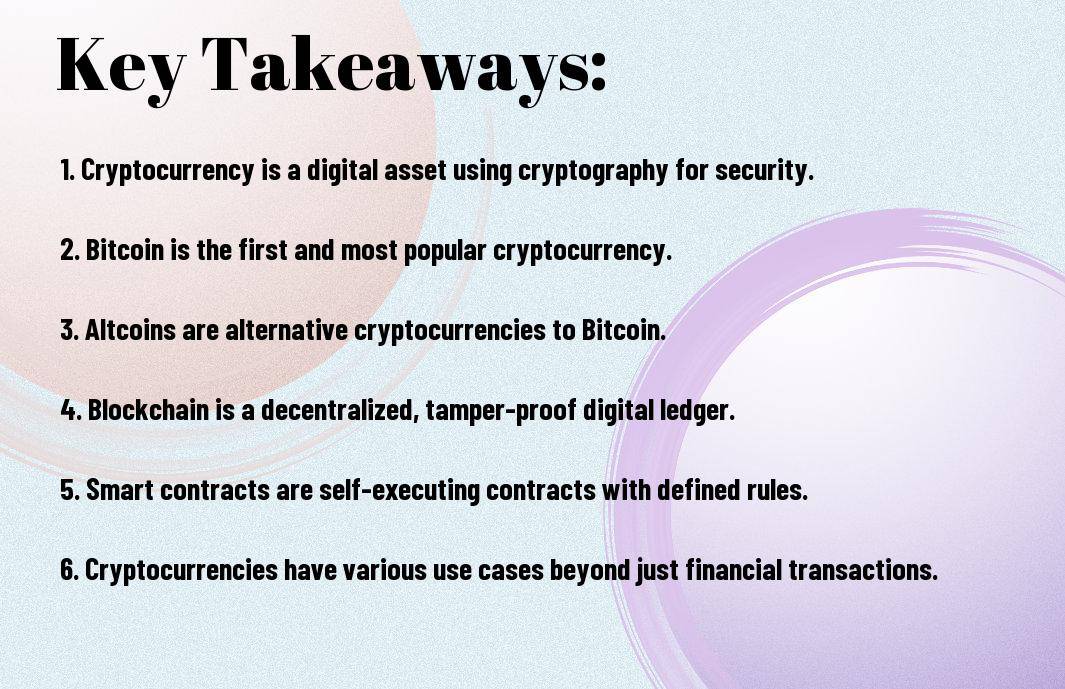
Newsletter Subscribe
Enter your email address below and subscribe to our newsletter

Enter your email address below and subscribe to our newsletter

With the rise in popularity of cryptocurrencies, it’s important to understand that there is more to this digital asset class than just Bitcoin. While Bitcoin may be the most well-known cryptocurrency, it is crucial to explore the diverse world of digital currencies to fully comprehend the opportunities and risks associated with this technology.
From the potential for high returns to the volatility and regulatory challenges that come with investing in cryptocurrencies, exploring beyond Bitcoin can provide a comprehensive understanding of this evolving financial landscape. By delving into alternative cryptocurrencies like Ethereum, Ripple, and Litecoin, individuals can gain a deeper insight into the technological advancements and innovative applications within the cryptocurrency space.


Clearly, cryptocurrencies are more than just Bitcoin. To truly understand the world of digital currencies, it’s crucial to investigate into the technology that underpins them. For a comprehensive overview of the technology behind cryptocurrencies, refer to Understanding Cryptocurrency: A Comprehensive Overview.
One of the key components of cryptocurrencies is the blockchain, a decentralized ledger that records all transactions across a network of computers. This technology ensures security, transparency, and immutability of data, making it a revolutionary innovation in the financial sector. Each block in the chain contains a set of transactions, and once verified by miners, it is added to the existing chain, creating a permanent record.
Blockchain technology is at the core of cryptocurrency mining, a process where transactions are validated and added to the blockchain. Miners solve complex mathematical problems using computational power, contributing to the security and integrity of the network. In return for their efforts, miners are rewarded with newly minted coins, incentivizing them to continue supporting the network and maintaining its operations.
Behind the scenes, mining plays a crucial role in the creation and distribution of cryptocurrencies. It ensures the authenticity of transactions and prevents double-spending, a significant challenge in the digital realm. As more miners participate, the network becomes more secure and resilient, fostering trust among users. It’s important to note that mining requires substantial energy consumption, leading to ongoing debates about its environmental impact.
To securely store and trade cryptocurrencies, individuals use digital wallets and exchanges. These digital tools allow users to manage their assets and conduct transactions with ease. Wallets come in different forms, such as hardware wallets for added security or online wallets for convenience. Exchanges, on the other hand, act as platforms where users can buy, sell, and trade various cryptocurrencies.
To navigate the world of digital assets, understanding the importance of secure storage and reliable trading platforms is crucial. Digital wallets provide a safe way to store private keys, ensuring that only the owner has access to their funds. Exchanges offer liquidity and market access, enabling users to participate in the dynamic crypto market. By choosing reputable providers and practicing good security measures, individuals can safeguard their investments in the volatile world of cryptocurrencies.
Cryptocurrencies encompass a diverse range of digital assets beyond Bitcoin, often referred to as ‘Altcoins’. These alternative cryptocurrencies serve different purposes, from improving upon Bitcoin’s technology to catering to specific use cases or industries. Altcoins offer variety in terms of consensus mechanisms, privacy features, and transaction speeds, allowing users to choose a digital asset that aligns with their specific needs and preferences.
For many investors and users, the volatility of traditional cryptocurrencies like Bitcoin can be a barrier to adoption. Stablecoins provide a solution by pegging their value to a stable asset, such as fiat currency or commodities, to reduce price fluctuations. This bridging of the crypto and fiat worlds offers a more stable store of value and a more familiar medium of exchange for everyday transactions.
Stablecoins play a crucial role in enabling more seamless interactions between traditional financial systems and the world of cryptocurrencies. They provide a middle ground for users who desire the benefits of blockchain technology without being exposed to the extreme price volatility associated with other digital assets.
Variety in the cryptocurrency space extends to tokens, digital assets built on existing blockchain networks with specific use cases defined by smart contracts. These tokens can represent anything from ownership of physical assets to access rights for services or platforms. By utilizing smart contracts, tokens enable programmable and automated transactions that go beyond simple value exchange.
Tokenization has the potential to revolutionize industries by streamlining processes, enhancing transparency, and creating new economic models through decentralized applications. The flexibility and functionality of tokens extend the utility of blockchain technology far beyond basic financial transactions.
Now, for individuals looking to probe into the world of cryptocurrencies beyond just Bitcoin, there are various avenues for investment and trading. One valuable resource to consult is the FCS5-475: Understanding Cryptocurrency guide, which provides comprehensive insights into digital assets.
Trading in cryptocurrencies is a dynamic environment influenced by various factors. Market dynamics in the cryptocurrency world are driven by supply and demand, investor sentiment, regulatory developments, and technological advancements. Prices of cryptocurrencies can be highly volatile, with values capable of experiencing significant fluctuations within short periods. Understanding these dynamics is crucial for successful trading and investment decisions.
On the front of strategies for trading and investment, individuals can employ techniques such as day trading, swing trading, and long-term investing. Day trading involves making frequent trades within a day to capitalize on short-term price movements. Swing trading involves holding assets for a few days or weeks to take advantage of price swings. Long-term investing, on the other hand, involves buying and holding assets for an extended period, betting on their potential long-term growth.
An understanding of various strategies and their associated risks is crucial for individuals venturing into cryptocurrency markets. It is crucial to conduct thorough research, stay updated on market trends, and be prepared for the inherent volatility of the digital asset space. Strategies should be aligned with individual risk tolerance levels and investment goals to maximize opportunities and mitigate potential losses.
Understanding the risks and rewards of cryptocurrency investment is vital for individuals considering entering this market. The volatility of cryptocurrencies presents both opportunities and risks. While significant gains can be made in short periods, substantial losses are also possible. Additionally, regulatory uncertainties, security risks, and market manipulation contribute to the complexity of the cryptocurrency landscape.
An awareness of these dynamics is crucial in navigating the cryptocurrency market effectively. It is crucial to approach cryptocurrency investment with caution, diversify portfolios, and consider seeking professional advice when necessary to make informed decisions and manage risks effectively.

All countries have different approaches to regulating cryptocurrencies, leading to a complex and diverse global regulatory landscape. Some nations, like Japan and Switzerland, have embraced cryptocurrencies and have put in place clear regulations to govern their use. On the other hand, countries such as China and India have taken a more cautious approach, imposing bans or restrictions on the trading of digital assets.
Compliance with tax laws and regulations is a crucial aspect of operating in the cryptocurrency space. Issues such as capital gains taxes, reporting requirements, and anti-money laundering measures must be carefully considered by businesses and individuals involved in cryptocurrency transactions. Failing to comply with these regulations can result in severe penalties and legal consequences.
Another critical consideration for individuals and businesses dealing with cryptocurrency is the need for proper record-keeping and reporting. Ensuring compliance with tax laws and regulations helps to prevent potential legal issues and demonstrates a commitment to operating within the boundaries of the law.
Now, as cryptocurrencies continue to gain traction in the financial world, it is important to understand their various use cases beyond just being a digital currency. For a comprehensive overview of cryptocurrencies like Bitcoin and Ethereum, you can refer to What Are Cryptocurrencies like Bitcoin, Ethereum and ….
Adoption of cryptocurrencies in retail and e-commerce settings is growing as more businesses recognize the benefits of accepting digital assets as payment. Companies like Overstock, Shopify, and Microsoft have integrated cryptocurrency payment options, allowing customers to make purchases using Bitcoin, Ethereum, and other digital currencies. This integration offers benefits such as lower transaction fees, faster settlement times, and increased security for both merchants and consumers.
The integration of cryptocurrencies in remittances and cross-border transactions has the potential to revolutionize the way money is transferred globally. The decentralized nature of cryptocurrencies like Bitcoin enables individuals to send funds across borders quickly and at a lower cost compared to traditional banking systems. Additionally, by bypassing intermediaries, cryptocurrencies can reduce the time it takes for funds to reach their destination, making them an attractive option for individuals and businesses involved in international transactions.
Transactions using cryptocurrencies for remittances and cross-border transactions can be completed in a matter of minutes, regardless of the sender and receiver’s locations. This speed and efficiency make cryptocurrencies an ideal solution for individuals who need to transfer funds quickly and securely across borders. Furthermore, the transparent nature of blockchain technology ensures that transactions can be tracked in real-time, providing greater visibility and security for all parties involved.
Retail adoption of cryptocurrencies in the developing world is a promising trend that has the potential to provide financial inclusion to millions of people who lack access to traditional banking services. In countries with unstable fiat currencies or limited banking infrastructure, cryptocurrencies offer a secure and decentralized alternative for storing and transferring value. Additionally, the low transaction fees associated with cryptocurrencies make them an affordable option for individuals in developing countries to send and receive money.
Cases of cryptocurrencies being used in the developing world highlight the positive impact these digital assets can have on financial inclusion and economic empowerment. By providing a secure and accessible financial system, cryptocurrencies have the potential to uplift underserved populations and drive economic growth in developing nations.

Despite the growing popularity of cryptocurrencies, the digital nature of these assets comes with inherent security risks. Unlike traditional banking systems, where there are regulatory bodies and controls in place, the decentralized and largely anonymous nature of cryptocurrencies makes them susceptible to various threats and vulnerabilities.
Protecting your crypto assets is important to safeguarding your investments in the volatile world of cryptocurrencies. Best practices include using a secure wallet that offers features like multi-factor authentication, cold storage options, and encrypted backups. Additionally, enabling strong password protection and regularly updating your software can help protect your assets from potential cyber threats and hacking attempts.
Once you enter the world of cryptocurrencies, you may encounter common threats and scams that can jeopardize your holdings. Scammers often use phishing emails, fake websites, and Ponzi schemes to lure unsuspecting investors into giving away their private keys or sending funds to fraudulent addresses.
With the rise of ransomware attacks and fake initial coin offerings (ICOs), it is crucial to exercise caution and due diligence when navigating the cryptocurrency space. Educating yourself about these common threats and scams can help you make informed decisions and protect your investments.
Many experts believe that the future of cryptocurrencies holds great potential for innovation and transformation in the financial industry and beyond. As the technology continues to evolve, new advancements are on the horizon that could revolutionize the way we interact with digital assets.
Future developments in the crypto space could include improvements in scalability, security, and privacy. Innovations such as sharding, off-chain payment channels, and zero-knowledge proofs are being explored to enhance the efficiency and speed of transactions. These advancements aim to address current challenges faced by cryptocurrencies, making them more user-friendly and accessible to a broader audience.
Cryptocurrency is poised to play a significant role in shaping the future economy. With the rise of decentralized finance (DeFi) and non-fungible tokens (NFTs), cryptocurrencies are expanding beyond simple digital currencies and paving the way for new financial models and digital asset ownership. As more industries adopt blockchain technology, cryptocurrencies are expected to bring greater efficiency, transparency, and security to various sectors.
Understanding the potential impact of cryptocurrencies on the future economy is crucial for individuals and businesses looking to stay ahead in the rapidly evolving digital landscape. While the technology offers promising opportunities for innovation and growth, it also comes with risks that must be carefully managed to ensure a sustainable and secure financial ecosystem.
Taking this into account, it is evident that cryptocurrencies, such as Bitcoin, are more than just a form of digital currency. They represent a new way of approaching financial transactions and decentralizing power away from traditional institutions. Understanding the underlying technology, such as blockchain, is crucial for grasping the full potential and benefits of cryptocurrencies.
It is important for individuals to continue educating themselves on the world of cryptocurrencies to stay informed and make well-informed decisions. The landscape of digital assets is constantly evolving, and staying ahead of the curve will be key to navigating the complexities of this new financial frontier.
A: Cryptocurrencies are digital or virtual currencies that use cryptography for security and operate independently of a central authority, making them decentralized and secure.
A: Cryptocurrencies work on a technology called blockchain, which is a distributed ledger enforced by a network of computers, ensuring transparency and immutability of transactions.
A: Bitcoin was the first cryptocurrency and remains the most popular and valuable. Other cryptocurrencies, known as altcoins, offer different features and use cases beyond just being a store of value.
A: Cryptocurrencies are stored in digital wallets, which can be online, offline, hardware-based, or paper-based. These wallets store the private keys needed to access and manage the funds.
A: The legal status of cryptocurrencies varies by country. While some countries embrace them as legitimate forms of payment, others have imposed restrictions or outright bans on their use.
A: Cryptocurrencies can be purchased on online exchanges using traditional currencies or other cryptocurrencies. It is important to choose a reputable exchange and secure wallet to store the purchased assets.
A: Cryptocurrencies can be used for online purchases, remittances, crowdfunding, smart contracts, and as a means of transferring value across borders quickly and securely.